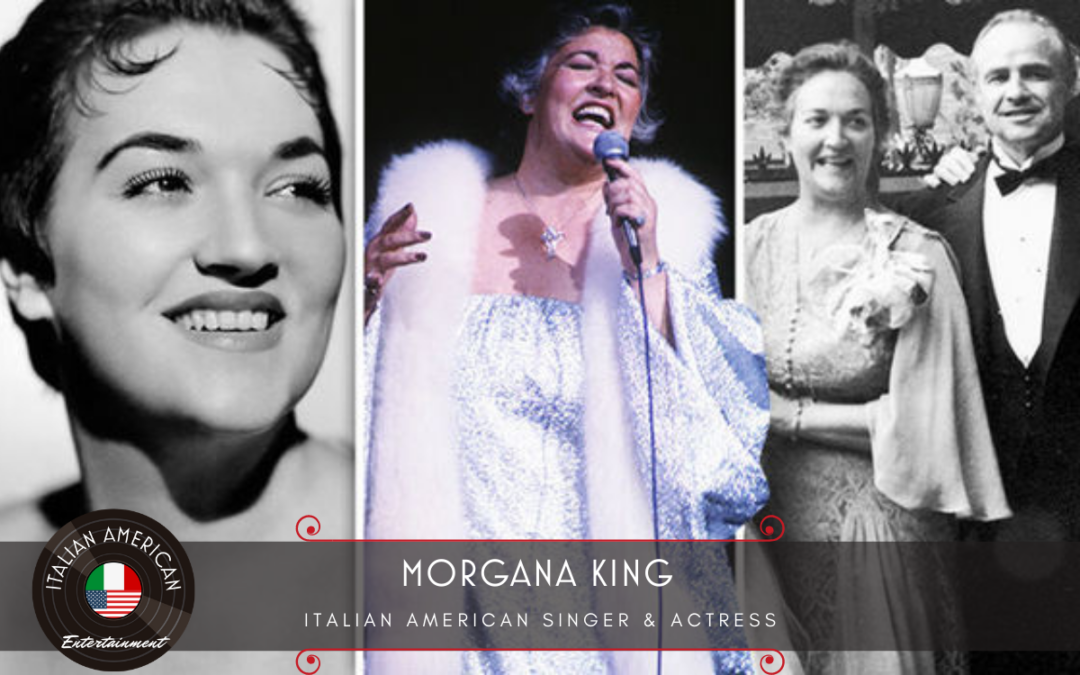Maria Grazia Morgana Messina was born in Pleasantville, New York. Her parents were from Fiumefreddo di Sicilia, Province of Catania, Sicily, Italy. She grew up in New York City with five siblings. Her father, who owned a coal and ice business, played the piano and guitar by ear. Her family experienced a difficult financial period after her father died.
Around the age of thirteen her vocal gifts were recognized when she was overheard singing the aria “I’ll See You Again” from Noël Coward’s operetta Bitter Sweet. At age 16 she developed a love for big bands. A scholarship to the Metropolitan School of Music soon followed.
Her professional singing career began at age sixteen as Morgana King. When she sang in a Greenwich Village nightclub in 1953, a record label executive took an interest after being impressed with the unique phrasing and multi-octave range. Three years later in 1956, her first album, For You, For Me, For Evermore, was released.
In the first appearance of Leonard G. Feather’s Encyclopedia of Jazz (1960), Morgana King stated that her ambition was “… to become a dramatic actress.” She began her acting career in The Godfather, directed by Francis Ford Coppola, as Carmela Corleone, wife of Don Vito Corleone. In the film, she sang the song “Luna mezzo mare”. King appeared as herself in the television documentary The Godfather: Behind the Scenes (1971). She reprised the role in The Godfather Part II (1974), where her character dies aged 62, due to natural causes.
King headlined clubs, concert halls and hotels, and toured throughout the United States, Europe, Australia and South America. Her repertoire contains more than two hundred songs on more than thirty albums. Most of her recordings and re-issues have not remained in the catalogs. In 1964, she received a Grammy Award nomination for Best New Artist. The award went to the Beatles.
Beginning with The Andy Williams Show and The Hollywood Palace in 1964. For more than a decade she performed on television talk and variety shows including The Mike Douglas Show, The Dean Martin Show and The David Frost Show.
King announced her retirement from performing during an engagement at the Cotton Club in Chicago on Friday, December 10, 1993, and added that her recording would not be affected by the decision.
She died, aged 87, of non-Hodgkin’s lymphoma in Palm Springs on March 22, 2018.
King’s voice is notable for its four-octave contralto range. She continued to pursue new forms of expression and presentation by exploring current music trends, which can be heard and read from the list of songs and composers on more than thirty albums. She ventured into new creative areas throughout her career all the while keeping contact with her musical point of origin in jazz. Her distinctive sound has its criticism and detractors.
In literature, the Library of Jazz Standards by Ronny Schiff (2002) recognizes Morgana King as one of the performers who made famous the songs “Imagination” (Van Heusen, Burke), “Like Someone in Love” (Van Heusen, Burke) and “Will You Be Mine” (Adair, Dennis). Also, there is the occasional mention of her in fiction.
Her signature song is “A Taste Of Honey”, originally released on the album With A Taste of Honey (Mainstream Records, 1964). Her most re-issued songs are “My Funny Valentine”, from Everything Must Change (Muse, 1978), and the title track of For You, For Me, For Evermore (EmArcy Records, 1956).

